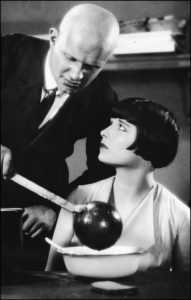3:00 pm | 1 hr 19 min | Drama | Live piano accompaniement with Marta Waterman | (Tagebuch einer Verlorenen – original title)
The Diary of a Lost Girl, G.W. Pabst’s second silent film starring the iconic Louise Brooks, will be the final offering in the Rosendale Theatre’s Sunday Silents 2016-17 Season, on March 5th at 3:00 PM. Produced in 1929, The Diary of a Lost Girl has seldom been seen. The second and last collaboration between Pabst and Brooks, The Diary was heavily edited for its shocking story and characters, and versions of varying length exist because of the cuts.

Part melodrama, part social commentary, The Diary of a Lost Girl is of interest as a period piece, and as a vehicle for the unique talents of Louise Brooks, who was not only a beauty, but an example of a 1920s flapper, with typical bobbed hair and freewheeling ways. Brooks and Colleen Moore pioneered the severe hair style that signified the look of a liberated woman of the 1920s.
G.W. Pabst was one of the most successful directors of European cinema in the 1920s and 1930s. He discovered and coached such actresses as Greta Garbo, Asta Nielson, Leni Riefensthal, and of course Louise Brooks.
Original piano music enhances all of the silent films of the Rosendale series, featuring Marta Waterman providing her own creativity.


